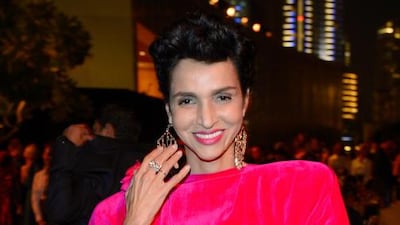Model, actress and filmmaker Farida Khelfa may be best known for being Jean Paul Gaultier’s muse, friends with Carla Bruni-Sarkozy and ambassador for the House of Schiaparelli, but being in the limelight was not on her agenda when she left her childhood home for Paris at the age of 16. “I didn’t plan anything,” she tells me. “For me, it was the only chance to be free – freedom was all I wanted.”
Khelfa was born in 1960 in Lyon to traditional Algerian parents. She left to start a new life in Paris, where she was discovered by a designer from Gaultier’s studio, and then quickly found herself at the centre of the fashion industry. “It was very cool and very easy: it wasn’t like an impossible world to reach,” she recalls.
Although she is celebrated around the world for her partnerships with international fashion houses, Khelfa admits that modelling didn’t come particularly naturally. Growing up, posing for photographs wasn’t really the norm – her family had just a few images of her grandfather and father, and she doesn’t remember seeing many photographs of herself as a child. She describes posing for the camera as a complicated inner battle. “It doesn’t show, but in my head it was difficult, exposing myself at 16. Even today, it is difficult,” she says during a talk at the spring/summer 2017 Fashion Forward in Dubai.
At the event, Khelfa is shown a handful of images representing her career highlights, such as the ones photographed by Jean-Paul Goude, and campaigns for Azzedine Alaïa, as well as an image from last year, where she was styled like Queen Nefertiti to promote Christian Louboutin’s lipstick range. But Khelfa refuses to acknowledge these photos as iconic: “An icon is a religious thing for me,” she says. What she reacts to – with a pleased “Ahh, j’adore” – is a 1995 photograph showing her pregnant with her first child, draped in pink, leaning against a backdrop emblazoned with Arabic calligraphy.
“It was a liberation for me, to have a baby,” she says. The theme of freedom is an important one in Khelfa’s life. When asked about her career highlights, she instead lists momentous occasions in her personal life: having her two children, meeting her husband and leaving her family as a teen. “Running away was liberating myself,” she reiterates.
When we meet, Khelfa is sporting a pair of tailored black trousers and a fitted black blazer with wing-like sequinned embellishments – a fitting ode to her stance on freedom. Her fingernails are painted in shocking pink, the signature colour of Elsa Schiaparelli, founder of the House of Schiaparelli. Three years ago, Khelfa was named as the face of the maison, which is in the process of trying to reinstate itself as a top contender in the world of haute couture.
While the industry relentlessly steams forward and adopts fast-fashion trends, Khelfa is confident that couture will maintain its relevance, and says that there will always be a market for women who can afford couture and will seek it out. She also thinks that Arab fashion designers could play a role in the future of couture. “There are some quite interesting designers here. I guess because they’ve been raised with couture clothing, they know a lot about fashion,” she says.
Though Khelfa is far from the stereotypical European model, she is charismatically French – she is expressive, talks with exaggerated hand gestures and ends many sentences with “voilà”. When an audience member refers her to as Arab, she is quick to declare: “I’m French.” Still, she acknowledges her “Arab blood”, and seems keen to support the Middle East’s design scene. “I think the fashion industry here is very important because there are a lot of clients here, and it opens windows to the rest of the world.”
After her talk, audience members praise Khelfa as a role model, style icon and exemplary working mother. When I tell her that she is regarded as a fashion influencer, she feigns surprise. We discuss the fact that the term is used more loosely these days, as a result of social media; however, Khelfa doesn’t see this as a negative. “There are famous people on Instagram, and that’s life, good for them. You can build yourself, make your own look and do your own thing, and suddenly you have followers who love your style,” she says. “I think it’s great, incredible and interesting. It’s today.”
Read this and more stories in Luxury magazine, out with The National on Thursday, December 8.
hlodi@thenational.ae

